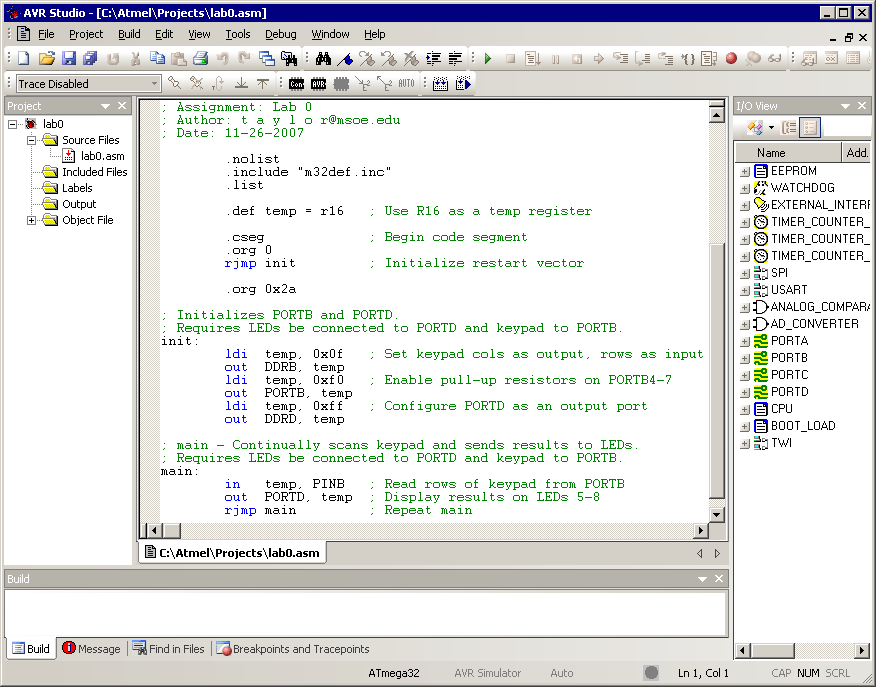

- #Atmel studio for mac mac os#
- #Atmel studio for mac serial number#
- #Atmel studio for mac install#
- #Atmel studio for mac manual#
Type "apropos word" to search for commands related to "word".
#Atmel studio for mac manual#
Find the GDB manual and other documentation resources online at: Type "show configuration" for configuration details.įor bug reporting instructions, please see: This GDB was configured as "-host=x86_64-apple-darwin10 -target=arm-none-eabi". There is NO WARRANTY, to the extent permitted by law. License GPLv3+: GNU GPL version 3 or later This is free software: you are free to change and redistribute it. Now, while OpenOCD is still running, we can test that gdb works by typing arm-none-eabi-gdb -iex "target extended-remote localhost:3333": $ arm-none-eabi-gdb -iex "target extended-remote localhost:3333" GNU gdb (GNU Tools for ARM Embedded Processors) 7.1217-cvsĬopyright (C) 2015 Free Software Foundation, Inc. Info : at91samd21e17.cpu: hardware has 4 breakpoints, 2 watchpoints If you launch OpenOCD again, you should get the following output: $ openocd Now you can plug the SWD header in the board you want to program (don't forget to power the board!). Info : SWCLK/TCK = 1 SWDIO/TMS = 1 TDI = 1 TDO = 1 nTRST = 0 nRESET = 1 Info : CMSIS-DAP: Interface Initialised (SWD) Info : only one transport option autoselect 'swd' adapter speed: 500 kHz You should get an output similar to this: $ openocd You can test you openocd.cfg file by simply typing openocd.
#Atmel studio for mac serial number#
On a MAC, you can find the serial number by searching through the output of the command system_profiler SPUSBDataType and on linux you would look through the output of lsusb -v. If you have several Atmel-ICE debuggers connected to your machine, you need to distinguish them by their serial number in the openocd.cfg file by adding the following line with your own serial number substitued: cmsis_dap_serial J418000123456 You should change the value at91samd21e17 to match the microcontroller you are using (e.g. For this purpose create a file called openocf.cfg, with the following content: # Atmel-ICE JTAG/SWD in-circuit debugger. The first step is to set up OpenOCD correctly.
#Atmel studio for mac install#
On the Mac, I used brew to install OpenOCD (see ): $ brew install openocd The ARM developper tools (arm-none-eabi) need to be installed your system. The board I used is a TAU (see ), but the procedure would be the same for the more popular SAMD21G18 that can be found on the Arduino Zero for example. I assume that the almost exact same procedure can be applied to linux.
#Atmel studio for mac mac os#
These notes describe how I program a SAMD21E17 breakout board with the Atmel ICE, using the command line on Mac OS X, without Atmel Sudio or any other IDE. At the time of writing, the download page is shown below but if it does work just type Microchip Studio 7 Download into your search engine and it will find it easier than searching on Microchip site.NOTE: an updated version of this article is available here

Obviously Microchip have moved all the download pages for this new version so old links don’t work. There also seems to be a move to add AVR microcontrollers to MPLAB X, the original PIC development environment. The installer offers to install XC8 C compiler as they are adding AVR support to that – haven’t looked at syntax differences yet but some rewriting will be necessary. Where Microchip go from here is anybody’s guess. Its look and feel are the same except the new logo. It also supports the same tools, such as AVRISP-MKII programmer and AVR ICE debugger. The code in all our Atmel Studio compiles and runs just fine and it uses the original AVR assembler and compiler. It still uses the same Solution and Project file extensions –.

We have looked at the new Microchip version and really nothing has changed. Their latest move is to rename Atmel Studio as Microchip Studio. Microchip took over Atmel (who made the AVR microcontroller) a few years ago and have been slowly erasing the Atmel brand.


 0 kommentar(er)
0 kommentar(er)
